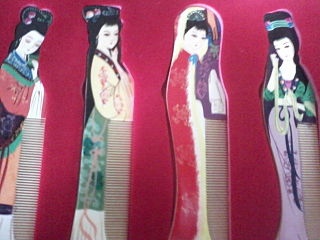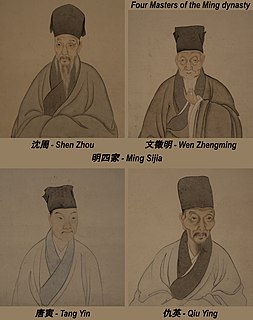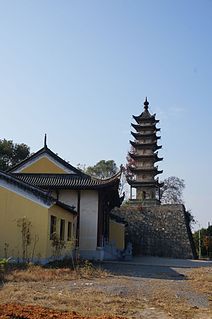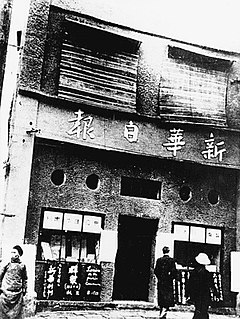 W
WThe Changzhou comb is a type of hand-painted comb produced in Changzhou, Jiangsu, China. In China, combs are called shubi (梳篦). The combs were originally made for use by royalty and have been in production for over 2000 years.
 W
WThe Four Masters of the Ming dynasty are a traditional grouping in Chinese art history of four famous Chinese painters of the Ming dynasty. The group are Shen Zhou (1427-1509), Wen Zhengming (1470-1559), both of the Wu School, Tang Yin (1470-1523), and Qiu Ying (c.1494-c.1552). They were approximate contemporaries, with Shen Zhou the teacher of Wen Zhengming, while the other two studied with Zhou Chen. Their styles and subject matter were varied. Shen and Wen exemplified the Wu School ideal of the gentleman artist, while Tang and Qiu epitomized the accomplished Suzhou professional. Qiu was solely a painter; the other three developed distinct styles of painting, calligraphy, and poetry.
 W
WJiangsu Art Gallery, usually known as Jiangsu Provincial Art Museum, is a museum in Nanjing, in Jiangsu province in China. It was founded in 1936, during the Nanjing decade, as China's first state level museum. In 1960, it was formally renamed as the Jiangsu Provincial Art Museum. In 2010 it re-opened in a new 27,449 square metres (295,460 sq ft) building designed by the German architect studio KSP Jürgen Engel Architekten.
 W
WXiju, also known as Wuxi opera, is a genre of opera which originated in the southern region of the Yangtze River Delta in China. It evolved from "Tanhuang" (滩簧), a folk opera art in the region of Wuxi and Changzhou of Jiangsu province. As one of the main local operas in Jiangsu Province, Wuxi opera has been reputed as "a piece of plum flower in Taihu Lake", a title given to the three major operas in East China, alongside Yue opera and Huangmei opera.
 W
WWuyue culture refers to the regional Chinese culture of the Wuyue people, a Han Chinese subgroup that has historically been the dominant demographic in the region of Jiangnan. Wuyue culture is characterized as being delicate, graceful and refined, having preserved many unique cultural traditions nonextant in other regions of China.
 W
WXinhua Daily was the first public newspaper published in the People's Republic of China by the Chinese Communist Party (CCP). It is owned by the Jiangsu Committee of the CCP.
 W
WYangzhou opera is a form of Chinese opera from Yangzhou in Jiangsu province. Its popularity has spread to Zhenjiang and Nanjing in Jiangsu, as well as Shanghai and parts of Anhui province. It made the first national intangible cultural heritage list in 2006.
 W
WYunjin, Nanjing brocade or Cloud brocade, is a traditional Chinese luxury silk brocade made in Nanjing since the end of the Song dynasty, and based on weft-weaving techniques from both the Song and Tang dynasties. It is shuttle-woven, and often incorporates gold and silver threads with the coloured silks. During the Ming dynasty, the yunjin weavers developed a technique of swivel weaving that enabled them to weave colourful designs onto a base fabric in other weaves, such as satin. In 2009, Nanjing brocade was selected into the representative list of oral and intangible heritage of humanity at UNESCO.